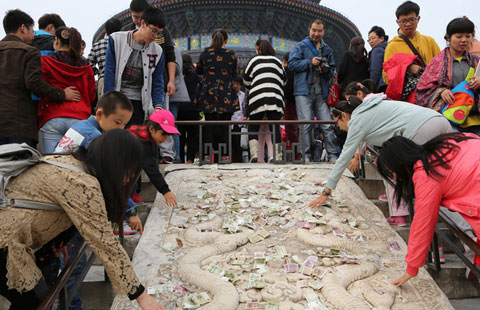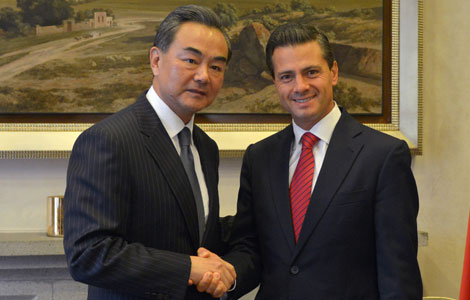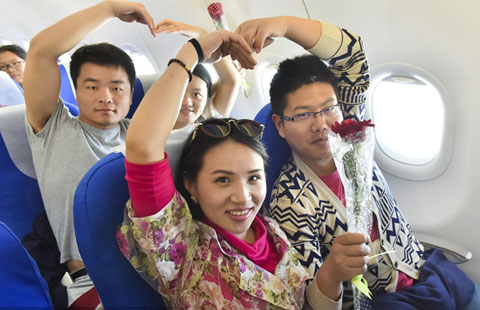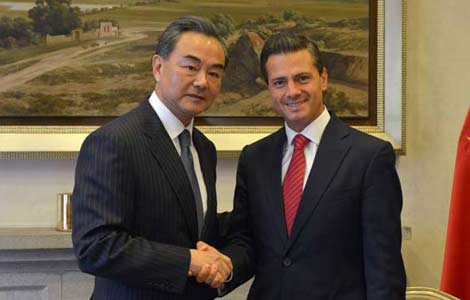China startups 'get smart' about healthcare devices
Updated: 2014-10-06 06:17
By LIAN ZI in San Francisco(China Daily USA)
|
||||||||
Chinese startup companies are finding vast potential in the intelligent healthcare market.
Instead of going to hospitals, expectant parents now can track their unborn baby's heartbeat with the handheld ultrasound devices pioneered by iCareNewLife.
Tao Jianhui, the Beijing-based company's CEO, discussed the market for pregnancy products with entrepreneurs in Silicon Valley at a recent seminar co-organized by Innospring, a technology incubator based in Santa Clara, California.
With a smartphone and tablet app, parents could visualize the baby's heartbeats and share it on their social media pages, such as Weibo and Wechat, with their family members and friends, Tao said.
"Sharing feelings and experiences on social networking service has already been one of the important emotional needs of Chinese young generations," he said.
Tao and Wang Xiao, CEO of Innospring, expressed their optimism about smart health monitoring devices, especially in the maternal market in China, because Chinese parents are known to spend when it comes to their children's future, starting with pregnancy.
With current technology, patients can examine themselves at home through smart medical devices and transfer the data to their doctors, Wang said.
Healthcare is a traditional industry that hasn't been developed as smartly as other sectors, especially in China, said Wang, who said that the healthcare system in China is relatively weak.
The key to designing and developing smart medical devices is to find the best way to promote interaction between patients and machines, said Wang, adding that sharing babies' heartbeats on social networking services is a good way to increase the interaction.
During the seminar, Tao also pointed out several challenges for startups looking to enter China's healthcare industry.
First, doctors in China do not trust the test results from other resources, like other hospitals and wearable devices purchased by patients elsewhere because they don't want to take a risk on misdiagnosis, Tao said.
Second, Chinese patients prefer to see trustworthy physicians even though patients' complaints usually involve long waiting lines at public hospitals. So it is not easy for startups to compete with large public healthcare providers in the Chinese market, said Tao.
Finally, it's tough for startups to deal with layers of stakeholders such as government agencies, hospitals and doctors.
Tao's approach to these obstacles is for startups in the healthcare sector to build brand, reputation and customer loyalty.
Moreover, startups should focus on developing in-home medical devices rather than hospital instruments that require professional certification.
"They should also learn about how to plan and promote their products with [the] lowest cost such as advertising on Weibo and Wechat," Tao added.
Wang believes the next boom in smart healthcare could be in childcare and elder care services as sensor technology grows. For example, a smartphone application under development will alert a relative or doctor if patients are alone and might be sick and incapacitated.
zilian@chinadailyusa.com

 Visitors trade cash for luck at World Heritage site
Visitors trade cash for luck at World Heritage site Sharapova beats Kvitova to win China Open
Sharapova beats Kvitova to win China Open
 China-Mexico ties deepen
China-Mexico ties deepen
 58 couples say 'I do' among the clouds
58 couples say 'I do' among the clouds
 Chinese convoy fleet executes escort missions in Gulf of Aden
Chinese convoy fleet executes escort missions in Gulf of Aden
 Chinese FM Wang Yi meets with Mexican president
Chinese FM Wang Yi meets with Mexican president
 China leads medal table as Asian Games close
China leads medal table as Asian Games close
 Highlights at Paris auto show
Highlights at Paris auto show
Most Viewed
Editor's Picks

|

|

|

|

|

|
Today's Top News
Some protesters in HK decide to withdraw
China startups 'get smart' about healthcare devices
Brazilians more aware of breast cancer symptoms, survey finds
Ebola patient in Dallas struggling to survive, says CDC head
Ebola could reach France and UK
China's Xinjiang Corp marks 60th anniversary
19 arrested over clash in Hong Kong
Li's European tour aims pragmatic cooperation
US Weekly

|

|







